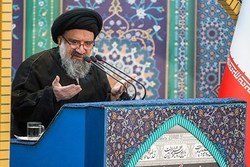 Tehran's provisional Friday Prayers Leader Ayatollah Seyed Ahmad Khatami warned enemies of the Islamic Republic to avoid posing military threats to the country.
Tehran's provisional Friday Prayers Leader Ayatollah Seyed Ahmad Khatami warned enemies of the Islamic Republic to avoid posing military threats to the country. RNA - Addressing a large and fervent congregation of the people in Tehran on Friday, Ayatollah Khatami said, "Iran’s ballistic missiles will land on the aggressors like thunderbolt."
The senior cleric, meantime, underlined that Iran’s missile program is of defensive and deterrent nature.
Ayatollah Khatami's remarks came after Iran unveiled its newly-developed long-range cruise missile named Hoveizeh in a ceremony participated by Defense Minister Brigadier General Amir Hatami.
Iran has gained self-sufficiency in manufacturing different types of missiles and weapons, but it has capped the range of its missiles to a maximum range of 2,000km.
Yet, after the US retreat from the nuclear deal and European states' pressures and insistence on talks with Iran to limit its missile program, several top military commanders in Tehran warned that such pressures could backfire.
Chief of Staff of the Iranian Armed Forces Major General Mohammad Hossein Baqeri stressed late in January that his country could change its defensive approach to offensive if its interests are endangered by enemies.
"Of course, we do not have any greedy eyes on other countries' interests and soil but it is possible that we adopt an offensive approach to protect our interests to make foreigners keep thoughts of aggression against our country's interests away even from their minds by witnessing impacts," General Baqeri said, addressing a meeting in Tehran on Jan. 27.
Then, five days later Lieutenant Commander of the Islamic Revolution Guards Corps (IRGC) Brigadier General Hossein Salami said that if Western powers seek to limit Iran’s missile power, the country will have no option but to expand its potentials in the strategically important field.
Salami made the remarks on February 3, when he reiterated that Iran’s strategy to maintain a cap on its missile power will change if the European Union and others seek to force the country into disarmament.
“If the Europeans and others want to pursue the missile disarmament of the Islamic Republic of Iran based on a plot, we will have no option but to resort to a strategic leap,” said Salami while speaking to the Iranian television.
The commander said Iran had no technical limits to expand the range, the destructive power and the propulsion system of its missiles, adding that it was Tehran’s policy to maintain a certain cap on the range of the missiles based on its own defensive strategy.
Salami said, however, that the cap could be removed if others decide to pressure Iran into dismantling its long-range missile arsenal.
“Our defense strategy can change commensurate with the conditions and changes in the behavior of role-players,” said the IRGC deputy commander.
The remarks came amid statements by certain EU governments about the need for Iran to avoid long-range missile tests in order for the country to enjoy the economic benefits of a nuclear agreement it signed in July 2015 with world powers.
Last Saturday Tehran unveiled its newly-developed long-range cruise missile named Hoveizeh in a ceremony participated by Defense Minister Brigadier General Amir Hatami.
"The range of Hoveizeh missile is over 1,350km and it is good for targeting ground targets," Hatami said, addressing the ceremony.
He mentioned rapid reaction, low flight altitude, high precision in navigation and high destruction power as among the main features of the missile.
"Hoveizeh ground-to-ground cruise missile has been test-fired in a 1,200-km range and it managed to precisely hit the specified target," Hatami said, adding that the missile will increase the Iranian Armed Forces' capabilities and Iran's deterrence power.
Iranian officials have repeatedly stressed that the US pressures have failed to force Tehran compromise and curb its defense and missile capabilities.
"We have (earlier) said about the missile issue that we will not compromise at all about our country's defense issues and will not allow others to interfere in it," Secretary of Iran's Supreme National Security Council (SNSC) Ali Shamkhani said last month.
He, meantime, reminded that Iran's missile capability is "defensive and deterrent".
Shamkhani referred to the US President Donald Trump's economic pressures against Iran with the aim of forcing the country to accept Washington's irrational and hegemonic demands, and said, "We will not compromise our honor under Trump's bullying. This is the clear message of the Iranian government to the White House; sanctions will no way serve as an instrument to enforce renegotiations on issues already agreed upon."
On Wednesday, Commander of the IRGC Aerospace Force Brigadier General Amir Ali Hajizadeh reiterated his country's firm opposition to holding talks on its defensive issues and missile program.
"The missile power is not negotiable. This deterrence power has been created for the country and we do not hold talks about it with anyone at all," General Hajizadeh said, addressing a forum in Tehran.
He underlined that Iran has not stopped missile tests, adding that they include long-range missiles too.
847/940